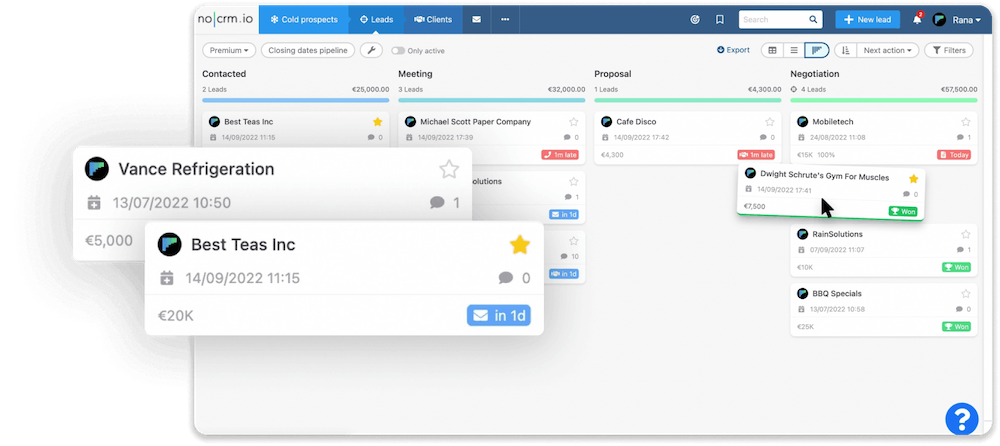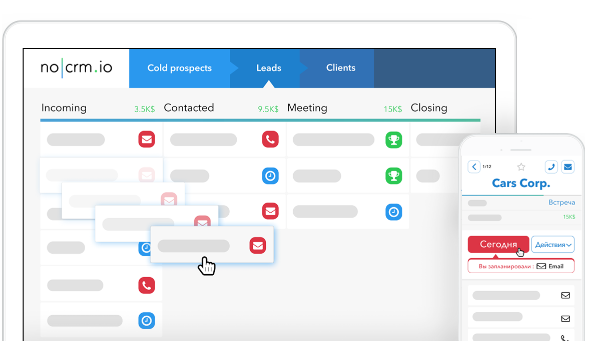
The rise of the solopreneur has been one of the most significant trends in the modern business world. With more individuals embarking on solo ventures all the time, the need for efficient, scalable tools has grown accordingly. In today’s vast digital landscape, solopreneurs have more options than ever for enhancing their workflow and driving better business outcomes.
However, the sheer amount of choice available can sometimes seem overwhelming, especially if you don’t know where to start. And the last thing you want is to end up with more tools to manage than time to manage them. After all, digital tools are supposed to increase your effectiveness, not reduce it.
To answer the question of what you need and why you need it, we’ll be breaking down the main categories of digital business tools that solopreneurs should consider using in the following article. At the end of each section, we’ve included a couple example programs as a jumping-off point for exploring the wide range of software solutions on offer. Without further ado, let’s dive in!
Project Management Tools
At the top of the list of important solopreneur tools are project management solutions. Given that you’re going to be primarily bootstrapping on your own, especially as you start out with your business, it stands to reason that there’s going to be a lot on your plate.
If you don’t have a way to navigate the complexities of multiple projects and deadlines, you run the risk of becoming overwhelmed, missing deadlines, and ultimately not extracting as much value from your work as you could.
The best project management tools provide a unified answer to all of these challenges in a single platform. With comprehensive feature suites that include functionalities for streamlining task organization, tracking projects at the macro- and micro-levels, and collaborating with clients and freelancers, they’re the perfect way to ensure you stay on top of your workload and achieve the goals you’ve set out for yourself.
Deadline reminders, task assignments, visual overviews of project progress—the list goes on. Moreover, project management tools often integrate with other business software tools, saving you from having to manually add information and add potential human error into the mix.
Note-Taking Tools
How many times have you had a world-changer of an idea, only to forget it later on? Note-taking has been an integral part of the entrepreneurial spirit since time immemorial, and with the recent explosion of technology across every aspect of the business world, this time-honored tradition has been enhanced accordingly.
Note-taking tools go way beyond simple text documents, offering budding solopreneurs a dynamic platform for capturing ideas, organizing information, and managing knowledge bases.

By supporting a range of data types—from text and images to links and documents—there’s no need to limit yourself when inspiration strikes. Most of these programs also offer advanced features like tagging, search functionalities, and hierarchical organization, making it easy to keep your digital workspace every bit as clean and tidy as your mental office.
And because they all support syncing across devices, you can count on having access to your notes wherever and however you need them, whether you’re at the desk or on the move. It can take a bit of time to set up, but once you’ve got your note-taking program up-and-running, it’ll save you countless hours in the long run, making these software tools a vital addition to any solopreneur’s digital arsenal.
Accounting Tools
Is there any part of a business that’s more fun than actually making money? Probably not. Unfortunately, the admin busywork required to track your financials isn’t quite as thrilling. But thankfully, we’ve evolved far beyond the traditional paper-and-pen bookkeeping models.
Today’s digital accounting tools offer a streamlined approach to tracking income, expenses, invoicing, taxes, and financial reporting. No matter how complex the business model, they’ll demystify the complexities of managing your finances, giving instant insight into the health of your business.
The value-add proposition of accounting tools doesn’t end there, however. Automated expense tracking, receipt scanning, and integrations with both legacy bank accounts and modern payment platforms simplify every aspect of your bookkeeping, reducing the likelihood of errors and saving valuable time.
And we can’t say enough good things about how useful it is to generate easy-to-read financial reports at the click of a button. They don’t just help you understand how business is going and forecast more accurately, they also aid you in longer-term strategic planning and decision-making. After all, trusting your gut is great, but it’s always better when you can support your choices with decisive bottom-line data.
Options to explore: QuickBooks, Waves
Payment Processing Tools
It has never been easier to collect revenue from your customers than today, thanks to the plethora of payment processing tools available to solopreneurs. Whether you’re selling products online or billing for services, there’s no smoother way to facilitate financial transactions—it literally is as easy as clicking a button.

These platforms don’t just stand on their own, however. By providing seamless integrations with websites, e-commerce stores, and mobile apps, they’re every bit as flexible as your business needs them to be, accommodating your business model as well as your customers’ diverse preferences.
Secure payment gateways and fraud detection tools take the guesswork out of the safety question, while recurring billing options enhance the reliability and professionalism of the payment process from both sides of the transaction. Plus, being able to manage and track payments with the tools themselves provides a consolidated overview of sales, revenue, and profit.
Transaction fees are a consideration, but generally speaking, the small percentage these companies take in return is far outweighed by the broader value they add to your business, taking into account the convenience, security, and next-level customer experience.
Social Media Management Tools
Imagine trying to run a successful business in 2024 without taking social media seriously. Granted, it might look a little overwhelming, especially if you’re working as a solopreneur.
Trying to keep track of all the various channels, accounts, passwords, posting schedules, audiences, content outlines can seem like a mammoth task. Luckily, social media management tools are here to help.
Invaluable for solopreneurs hoping to maintain an active and engaging online presence across a range of different social media platforms, these tools streamline every aspect of the process. From scheduling posts to monitoring engagement, from analyzing performance to refining your high-level strategy, they’ll help you save time, enhance the effectiveness of your strategies, and avoid a whole world of social media headaches.
Content calendars and bulk scheduling features provide a structured approach to the whole process, while advanced analytics dashboards give you all the insights you need into how your content is performing, where it’s falling short, and how you might want to improve your output. If you’re a solopreneur who wants to build an online audience and keep them engaged with your brand or business, social media management tools are an absolute must-have.
Email Marketing Tools
The realm of email marketing shares a lot of crossovers with social media management, since they’re both crucial aspects of the broader digital marketing sphere, but it’s different enough to merit its own category. At the end of the day, emails are the lowest-friction way to engage with your audience—you can reach your customers anytime and any place, making it easier than ever to build and nurture those all-important relationships.

Email marketing platforms offer a wide range of features to help solopreneurs craft and execute effective email campaigns. Customizable templates and drag-and-drop editors make creating the emails themselves a breeze, while segmentation and automation tools ensure you’re delivering the right message to the right person at the right time.
As with many of the software packages on this list, email marketing programs aren’t light on analytics, either, providing all the metrics you need to analyze campaign performance, refine your strategy, and ultimately boost your overall conversion rates. The key to email marketing success is choosing the right cost-benefit balance.
The leading brands all offer similar feature suites, making it a question of what scale your business is currently operating at and how much bandwidth it really needs.
Appointment Scheduling Tools
Gone are the days when setting appointments meant leaving a memo with your secretary and navigating a complex back-and-forth to ensure schedules align. Today, solopreneurs can leverage a number of different digital tools to achieve the same result with just a few clicks.
By providing a seamless interface for clients to book meetings without needing an ongoing email chain, these platforms save time and hassle for everybody involved, making it easier than ever for your clients to get in touch with you.
These tools sync with personal calendars to reflect real-time availability, and are easily updated in case of any last-minute adjustments that need accounting for. Customizable time slots and meeting types are the ideal way to guarantee that everybody’s unique needs are accounted for, while automated reminders and confirmation notifications cut down on no-shows, making life easier for solopreneur and client alike.
And because they integrate with video conferencing platforms, getting from your calendar to a one-on-one Zoom call is often a matter of a single click. There’s no simpler way to sum it all up than this: if you’re not using an appointment scheduling tool, you’re missing out—massively.
CRMs
Last—but by no means least—we have Customer Relationship Management (CRM) tools. In a certain sense, this is where it all comes together. By collating all the information from your other digital platforms in a single, easy-to-use digital workspace, you’ll be able to manage your interactions with current and potential clients, build stronger relationships, and drive more sales.

Thanks to comprehensive customer interaction tracking features, you can leverage instant insight into each and every relationship at the click of a button, meaning you’ll never turn up to a meeting unprepared. Sales pipelines give you a visual overview of how your sales funnel is progressing, helping you to keep your eye on the prize and stay on top of your efforts from prospecting all the way through to closing.
Additional features, such as integrated invoices and quotes, contact management, deal tracking, and performance analytics, help solopreneurs personalize their approach and efficiently manage a wide range of sales activities. The best CRMs for solopreneurs also offer advanced automation capabilities, perfect for eliminating the busywork required in executing repetitive tasks like follow-ups and data entry and therefore freeing up time for more strategic sales work.
While CRMs vary in complexity and price, choosing a tool that aligns with your own sales processes and scale will be transformative for your customer engagement and strategies, significantly driving business growth in the long run.
You can try noCRM for free right now, by clicking here.
There are a huge amount of tools to choose from as a solopreneur looking to enhance your business’s effectiveness. However, by breaking your main needs into different categories and analyzing them separately, you stand a great chance at being able to cut out the noise and hone in on what your business really needs.
As you set about deciding which program best suits you, keep scale at the forefront of your mind. There’s no point paying extra for a set of features your business doesn’t actually need at the moment, after all. Similarly, if the program you’ve paid for isn’t able to handle everything you ask from it, the whole exercise could be counterproductive, leading to wasted time and slower growth than you could be driving otherwise.
Digital tools aren’t just a way to manage tasks: they’re vital elements for unlocking potential and driving growth. And remember, it’s not about using as many programs as possible—it’s about using the right ones.


